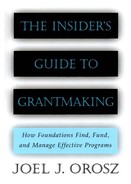Chapter Ten
Managing the Project
“When the gods wish to punish you,” advises the old proverb, “they make your dreams come true.” Many a program officer has learned the truth of these words after the committee or board has funded a project that he or she recommended. The moment you receive approval, your role as program officer once more changes dramatically, and that new role can seem rather punishing compared with that of championing a request. Recall that you begin as a sentry, protecting the foundation's resources from unworthy ideas. Then, when you encounter a good idea and become convinced of its worth, you transform into an advocate for the applicant: a steward. Now, after that advocacy has succeeded and the proposal has become a project, you must shift gears once more and become a manager of the funded project.
Almost inevitably, program officers find management to be the most challenging aspect of their jobs. Part of this, of course, is because management is hard under any circumstances. Squeezing the most out of resources and inspiring people to give their best are challenging even when the manager has authority to attempt these things—and you do not have that authority. What you do have is a distinctive management challenge with which to contend; and with numerous projects in your portfolio, that challenge is multiplied many times over.
What makes this style of management so distinctive is that you are partially responsible for delivering results from an organization of which you are neither an employee nor a board member. Another complication is that frequently the project for which you are responsible represents only a single facet of a very complex organization, and this facet is sometimes far from the top of the organizational priority list. Further, the project may be dependent on “soft money”—other grants from other sources—to fully operate, and these grants will start and stop on a schedule over which you have no control. Small wonder, then, that grantmakers find project management such a challenge: without authority to make things happen and in the midst of many competing priorities, they must somehow manage for results.
It would seem that you have available at least one “big stick” to get these results: the leverage of money. Everyone wants foundation dollars. Everyone wants to stay on your good side. Therefore, even if you have no direct authority, even if the project is not the organization's top priority, and even if soft money comes and goes unpredictably, you can still use the power of the purse to make things happen.
There is some truth to this analysis, but it considerably overstates the case. Although grantseekers need foundation money, grantmakers also need good grantseekers, so the power of the purse is far from absolute. The influence of money, moreover, is always strongest in prospect. That is to say, you have maximum influence before a grant is made, while the request is still under consideration. The reason for this is simple: although foundations routinely decline grant requests, they only rarely demand that grantees refund the money granted to them; this step, due to the expense, complications, and embarrassment involved, is usually reserved for only those very few grantees that are, like Tom Terrific's nemesis Crabby Appleton, “rotten to the core.”
The new grantee knows that disagreements over management of the project almost surely will not lead to the grant's being revoked. If the commitment is for only one year, the foundation has lost nearly all of its leverage; if it is a multiyear grant, you still have some clout in that you can delay or even deny future installments of the commitment. Even in the case of multiyear grants, however, you would much rather see the commitment completed than not. Ironically, then, you have plenty of clout before a project is funded and very little after it is funded, which is naturally when you need it the most.
Despite all of these daunting challenges, you can become a surprisingly effective manager of projects for which you are responsible. You cannot control, but you can influence. You cannot demand, but you can persuade. You cannot buy loyalty, but you can use the power of the purse for positive ends. And, most important, you cannot hire and fire people, but you can promote the growth of a true partnership.
